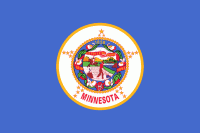|
Trails to the Past would appreciate any genealogy information that you may have such as news items, wills, deaths, births, biographies etc. if you have any of these items they can be emailed to Marie Miller the state of Minnesota Adminstrator
The county was formed from
territory within Wabasha County on March 5, 1853. County
boundaries were defined in 1854 and further refined again in
1855.
The county was originally
settled exclusively by "Yankee" settlers, meaning that they
both came to Goodhue County either directly from the six New
England states or they came from upstate New York, where they
were born to parents who had moved to that region from the six
New England states in the immediate aftermath of the American
Revolution, and that they were descended from the English
Puritans who emigrated to North America during the early
1600's. Because of the prevelance of New Englanders and New
England transplants from upstate New York the county was said
to have a "distinctly New England character". While this was
true of many neighboring counties it was considered
exceptionally true of Goodhue County. The New Englanders
brought with them many of their New England values including a
love of education and a fervent support of the abolitionist
movement. When the New Englanders first arrived in what has
since become Goodhue County, there was nothing but a wild
prairie. They laid out farms, established post routes, and
built schools and government buildings out of locally
available materials. The New Englanders and their descendants
made up the great majority of Goodhue county's inhabitants
until the late nineteenth and early twentieth century, at
which point immigrants from Germany and Norway began arriving
in the Minnesota-Wisconsin border region in large numbers.
There were however small numbers of immigrants from Germany,
Norway and Sweden, during the first several decades of Goodhue
County's history as well.
Hamline University, Minnesota's first
college of higher learning, was originally located in Red
Wing, Minnesota. It opened its doors in 1854 but closed during
the Civil War due to low enrollment. Hamline University
re-opened in Saint Paul, Minnesota in 1869.
The county was a leading producer of
wheat during the mid-nineteenth century, and for several years
the county boasted the highest wheat production in the
country, sending wheat through numerous mills in Red Wing and
then transporting the grain along the Mississippi River. The
effect of fires at two of Red Wing's mills in the 1880s and
developing railroad routes across Minnesota encouraged farmers
from neighboring counties to begin sending their wheat to
Minneapolis mills, reducing the county's importance in the
wheat trade around the start of the 20th
century.
|
|
Cities
Bellechester
Cannon Falls
Dennison
Goodhue
Kenyon
Lake City
Pine Island
Red Wing (county
seat)
Wanamingo
Zumbrota
Census-designated
place
Frontenac
Other unincorporated
communities
Belle Creek
Belvidere
Mills
Bombay
Claybank
Forest
Mills
Hader
Hay
Creek
Roscoe
Ryan
Skyberg
Sogn
Stanton
Vasa
Wacouta
Wangs
Wastedo
Welch
White
Rock
Ghost town
Thoten/Belvidere |
Townships
Belle Creek
Township
Belvidere Township
Cannon Falls
Township
Cherry Grove Township
Featherstone
Township
Florence Township
Goodhue Township
Hay
Creek Township
Holden Township
Kenyon
Township
Leon Township
Minneola Township
Pine
Island Township
Roscoe Township
Stanton
Township
Vasa Township
Wacouta
Township
Wanamingo Township
Warsaw
Township
Welch Township
Zumbrota
Township
|
The information
on Trails to the Past © Copyright may be used in personal family history research, with source citation. The pages in entirety may not be duplicated for publication in any fashion without the permission of the owner. Commercial use of any material on this site is not permitted. Please respect the wishes of those who have contributed their time and efforts to make this free site possible.~Thank you! |



